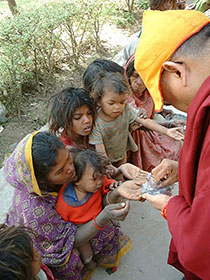- Home
- FPMT Homepage
Foundation for the Preservation of the Mahayana Tradition
The FPMT is an organization devoted to preserving and spreading Mahayana Buddhism worldwide by creating opportunities to listen, reflect, meditate, practice and actualize the unmistaken teachings of the Buddha and based on that experience spreading the Dharma to sentient beings. We provide integrated education through which people’s minds and hearts can be transformed into their highest potential for the benefit of others, inspired by an attitude of universal responsibility and service. We are committed to creating harmonious environments and helping all beings develop their full potential of infinite wisdom and compassion. Our organization is based on the Buddhist tradition of Lama Tsongkhapa of Tibet as taught to us by our founders Lama Thubten Yeshe and Lama Thubten Zopa Rinpoche.
- Willkommen
Die Stiftung zur Erhaltung der Mahayana Tradition (FPMT) ist eine Organisation, die sich weltweit für die Erhaltung und Verbreitung des Mahayana-Buddhismus einsetzt, indem sie Möglichkeiten schafft, den makellosen Lehren des Buddha zuzuhören, über sie zur reflektieren und zu meditieren und auf der Grundlage dieser Erfahrung das Dharma unter den Lebewesen zu verbreiten.
Wir bieten integrierte Schulungswege an, durch denen der Geist und das Herz der Menschen in ihr höchstes Potential verwandelt werden zum Wohl der anderen – inspiriert durch eine Haltung der universellen Verantwortung und dem Wunsch zu dienen. Wir haben uns verpflichtet, harmonische Umgebungen zu schaffen und allen Wesen zu helfen, ihr volles Potenzial unendlicher Weisheit und grenzenlosen Mitgefühls zu verwirklichen.
Unsere Organisation basiert auf der buddhistischen Tradition von Lama Tsongkhapa von Tibet, so wie sie uns von unseren Gründern Lama Thubten Yeshe und Lama Thubten Zopa Rinpoche gelehrt wird.
- Bienvenidos
La Fundación para la preservación de la tradición Mahayana (FPMT) es una organización que se dedica a preservar y difundir el budismo Mahayana en todo el mundo, creando oportunidades para escuchar, reflexionar, meditar, practicar y actualizar las enseñanzas inconfundibles de Buda y en base a esa experiencia difundir el Dharma a los seres.
Proporcionamos una educación integrada a través de la cual las mentes y los corazones de las personas se pueden transformar en su mayor potencial para el beneficio de los demás, inspirados por una actitud de responsabilidad y servicio universales. Estamos comprometidos a crear ambientes armoniosos y ayudar a todos los seres a desarrollar todo su potencial de infinita sabiduría y compasión.
Nuestra organización se basa en la tradición budista de Lama Tsongkhapa del Tíbet como nos lo enseñaron nuestros fundadores Lama Thubten Yeshe y Lama Zopa Rinpoche.
A continuación puede ver una lista de los centros y sus páginas web en su lengua preferida.
- Bienvenue
L’organisation de la FPMT a pour vocation la préservation et la diffusion du bouddhisme du mahayana dans le monde entier. Elle offre l’opportunité d’écouter, de réfléchir, de méditer, de pratiquer et de réaliser les enseignements excellents du Bouddha, pour ensuite transmettre le Dharma à tous les êtres. Nous proposons une formation intégrée grâce à laquelle le cœur et l’esprit de chacun peuvent accomplir leur potentiel le plus élevé pour le bien d’autrui, inspirés par le sens du service et une responsabilité universelle. Nous nous engageons à créer un environnement harmonieux et à aider tous les êtres à épanouir leur potentiel illimité de compassion et de sagesse. Notre organisation s’appuie sur la tradition guéloukpa de Lama Tsongkhapa du Tibet, telle qu’elle a été enseignée par nos fondateurs Lama Thoubtèn Yéshé et Lama Zopa Rinpoché.
Visitez le site de notre Editions Mahayana pour les traductions, conseils et nouvelles du Bureau international en français.
Voici une liste de centres et de leurs sites dans votre langue préférée
- Benvenuto
L’FPMT è un organizzazione il cui scopo è preservare e diffondere il Buddhismo Mahayana nel mondo, creando occasioni di ascolto, riflessione, meditazione e pratica dei perfetti insegnamenti del Buddha, al fine di attualizzare e diffondere il Dharma fra tutti gli esseri senzienti.
Offriamo un’educazione integrata, che può trasformare la mente e i cuori delle persone nel loro massimo potenziale, per il beneficio di tutti gli esseri, ispirati da un’attitudine di responsabilità universale e di servizio.
Il nostro obiettivo è quello di creare contesti armoniosi e aiutare tutti gli esseri a sviluppare in modo completo le proprie potenzialità di infinita saggezza e compassione.
La nostra organizzazione si basa sulla tradizione buddhista di Lama Tsongkhapa del Tibet, così come ci è stata insegnata dai nostri fondatori Lama Thubten Yeshe e Lama Zopa Rinpoche.
Di seguito potete trovare un elenco dei centri e dei loro siti nella lingua da voi prescelta.
- 欢迎 / 歡迎
简体中文
“护持大乘法脉基金会”( 英文简称:FPMT。全名:Foundation for the Preservation of the Mahayana Tradition) 是一个致力于护持和弘扬大乘佛法的国际佛教组织。我们提供听闻,思维,禅修,修行和实证佛陀无误教法的机会,以便让一切众生都能够享受佛法的指引和滋润。
我们全力创造和谐融洽的环境, 为人们提供解行并重的完整佛法教育,以便启发内在的环宇悲心及责任心,并开发内心所蕴藏的巨大潜能 — 无限的智慧与悲心 — 以便利益和服务一切有情。
FPMT的创办人是图腾耶喜喇嘛和喇嘛梭巴仁波切。我们所修习的是由两位上师所教导的,西藏喀巴大师的佛法传承。
繁體中文
護持大乘法脈基金會”( 英文簡稱:FPMT。全名:Found
ation for the Preservation of the Mahayana Tradition ) 是一個致力於護持和弘揚大乘佛法的國際佛教組織。我們提供聽聞, 思維,禪修,修行和實證佛陀無誤教法的機會,以便讓一切眾生都能 夠享受佛法的指引和滋潤。 我們全力創造和諧融洽的環境,
為人們提供解行並重的完整佛法教育,以便啟發內在的環宇悲心及責 任心,並開發內心所蘊藏的巨大潛能 — 無限的智慧與悲心 – – 以便利益和服務一切有情。 FPMT的創辦人是圖騰耶喜喇嘛和喇嘛梭巴仁波切。
我們所修習的是由兩位上師所教導的,西藏喀巴大師的佛法傳承。 察看道场信息:
- FPMT Homepage
- News/Media
-
- Study & Practice
-
-
- About FPMT Education Services
- Latest News
- Programs
- New to Buddhism?
- Buddhist Mind Science: Activating Your Potential
- Heart Advice for Death and Dying
- Discovering Buddhism
- Living in the Path
- Exploring Buddhism
- FPMT Basic Program
- FPMT Masters Program
- FPMT In-Depth Meditation Training
- Maitripa College
- Lotsawa Rinchen Zangpo Translator Program
- Universal Education for Compassion & Wisdom
- Online Learning Center
-
- Prayers & Practice Materials
- Overview of Prayers & Practices
- Full Catalogue of Prayers & Practice Materials
- Explore Popular Topics
- Benefiting Animals
- Chenrezig Resources
- Death & Dying Resources
- Lama Chopa (Guru Puja)
- Lama Zopa Rinpoche: Compendium of Precious Instructions
- Lama Zopa Rinpoche: Life Practice Advice
- Lama Zopa Rinpoche Practice Series
- Lamrim Resources
- Mantras
- Prayer Book Updates
- Purification Practices
- Sutras
- Thought Transformation (Lojong)
- Audio Materials
- Dharma Dates - Tibetan Calendar
- Translation Services
- Publishing Services
- Ways to Offer Support
- Prayers & Practice Materials
-
- Teachings and Advice
- Find Teachings and Advice
- Lama Zopa Rinpoche Advice Page
- Lama Zopa Rinpoche: Compendium of Precious Instructions
- Lama Zopa Rinpoche Video Teachings
- ༧སྐྱབས་རྗེ་བཟོད་པ་རིན་པོ་ཆེ་མཆོག་ནས་སྩལ་བའི་བཀའ་སློབ་བརྙན་འཕྲིན།
- Podcasts
- Lama Yeshe Wisdom Archive
- Buddhism FAQ
- Dharma for Young People
- Resources on Holy Objects
- Teachings and Advice
-
-
*If a menu item has a submenu clicking once will expand the menu clicking twice will open the page.
-
-
- Centers
-
- Teachers
-
- Projects
-
-
-
-
*If a menu item has a submenu clicking once will expand the menu clicking twice will open the page.
-
-
- FPMT
-
-
-
-
-
Each one of us is responsible for all other living beings’ happiness besides our own. As a result, your loving kindness is the most wish fulfilling thing in life, more precious than anything else in the world. That makes for a most satisfying, fulfilling life.
Lama Zopa Rinpoche
-
-
-
- Shop
-
-
-
The Foundation Store is FPMT’s online shop and features a vast selection of Buddhist study and practice materials written or recommended by our lineage gurus. These items include homestudy programs, prayers and practices in PDF or eBook format, materials for children, and other resources to support practitioners.
Items displayed in the shop are made available for Dharma practice and educational purposes, and never for the purpose of profiting from their sale. Please read FPMT Foundation Store Policy Regarding Dharma Items for more information.
-
-
FPMT News Around the World
18
New Online Feature Story from Mandala!
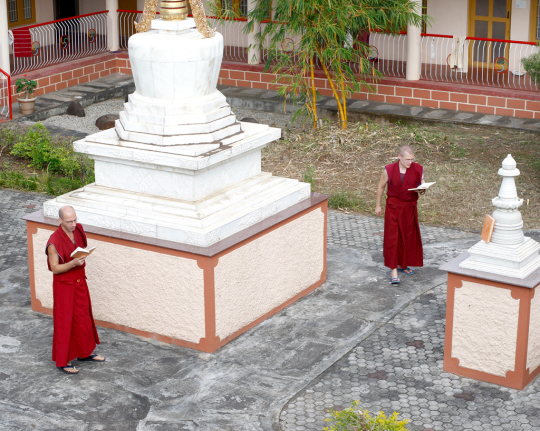
Monks working on memorization at Sera IMI House, Bylakuppe, India, November 2013. Photo by Sandesh Kapur|www.felis.in.
“Memorization: Beneficial Exercise for the Mind,” our online feature story for February, has just been published! American monk Ven. Tenzin Gache (Brian Roiter), who just finished his seventh year at Sera Je Monastic University, writes about the history and role of memorization in monastic education and offers memorization tips to help lay students build their own memorization skills. Earlier this month, Ven. Gache received the top award in Sera Je’s lo gyü chenmo (Great Memorization Exam), having committed 873 pages to memory. Here’s a short excerpt from Ven. Gache’s article, which you can read in its entirety on FPMT.org/Mandala:
In his biography of his teacher, Khedrub Je claims that Lama Tsongkhapa would memorize an astounding 17 folios (34 pages) of Buddhist text per day. Two natural reactions to this statement might be, “Is that even possible? It must be exaggerated,” and “Is that really a constructive use of one’s time and energy?” Without giving direct answers to these questions, I would like to respond first by describing a little bit about the place of memorization in Buddhist practice, both historically and today, and some of its potential benefits.
Memorization has played a central role in the Buddhism’s saga since its earliest days. For the first few hundred years, the sutras and their commentaries were not written down. Monks and nuns would work together to keep these discourses in memory, orally passing them on to the next generation. In the First Council of Arhats shortly after the Buddha’s passing [also known as the First Buddhist Council, c. 550-450 BCE], his attendant Ananda recited from memory the entirety of the Sutra Pitaka [the collection of sutras], while another monk, Upali, recited the discourses on vinaya [monastic discipline]. Even after these discourses were committed to paper, memorization remained a standard practice in the monasteries and nunneries of India. The great scholar-practitioner Acharya Vasubandhu [c. 4th century CE] is said to have maintained a yearly ritual wherein he would sit upright for several days, gradually reciting all of the texts he had memorized in a bathtub of oil to keep himself awake. More recently, Geshe Rabten [1921-86 CE] observed a similar yearly ritual, but without the oil.
Memorization of the sutras and their commentaries is a standard monastic practice in all Buddhist countries, but here I will focus mainly on its expression in my own monastery, Sera Je, one of the three great Gelug monastic universities now located in South India. … read more
In case you missed last month’s online feature, “Jeffrey Hopkins’ Transmission of Honesty,” you can read it now. If you like Mandala’s online features, consider becoming a Friends of FPMT, which supports our work as well as the education programs of FPMT.
16
Geshe Kelsang Wangmo Visits Jamyang Buddhist Centre London
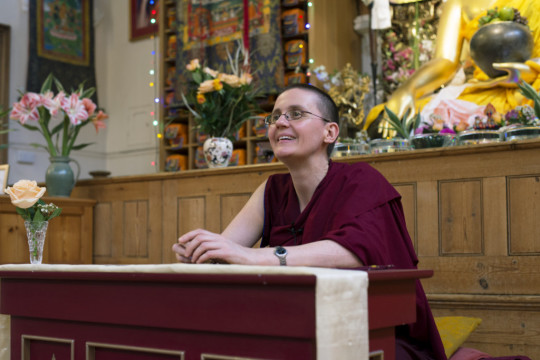
Geshe Kelsang Wangmo teaching at Jamyang Buddhist Centre London, November 2014. Photo by Natascha Sturny.
“We were very honored to welcome Geshe Kelsang Wangmo last November,” said Jamyang Buddhist Centre London’s Natascha Sturny. “She kindly agreed to visit us as part of her first UK tour at the invitation of FPMT UK.
“On the evening of November 14, Geshe Wangmo gave a public talk on her experience of studying to become a geshe. The big gompa was full with people happy to meet Geshe-la for the first time and curious to hear her story.
“Many of the audience probably knew that she was the first woman in history to receive the Geshe degree, but to actually hear the story from herself was a great pleasure, often funny and definitely ‘mind blowing.’ Geshe Wangmo enthusiastically, and with a good portion of humor, explained in detail of how she became a geshe. The audience was charmed by her personality, eagerly listening and asking questions. Many were left admiring Geshe Wangmo‘s strength and determination to go through the scholastic curriculum for over 16 years.
“On November 16, Geshe Wangmo gave a day-long teaching on ‘Is the Buddha Reliable?’ Basing the talk on her own translation of and previous teaching on the second chapter of Dharmakirti’s Commentary on Pramana, she gave a superb overview of the chapter’s four sections that establish the Buddha is valid, authoritative and reliable.
“We eagerly await her return sometime in the next two years as she has promised to teach for four days on the same chapter, giving more depth to her presentation of each of the sections.”
Mandala brings you news of Lama Zopa Rinpoche and of activities, teachings and events from nearly 160 FPMT centers, projects and services around the globe. If you like what you read on Mandala, consider becoming a Friend of FPMT, which supports our work.
- Tagged: geshe kelsang wangmo, jamyang buddhist centre
- 0
9
Grants from Merit Box Project Support Carers in UK and Australia

Ani Barbara Shannon and Tracy Chau during a Repaying the Kindness holiday celebration
Every year, the International Merit Box Project collects offerings from students all around the world and disburses them as grants to deserving FPMT centers, projects and services. Since 2001, almost US$1,000,000 in Merit Box grants has been given to build stupas, help long-term retreaters cook and stay warm, publish Dharma books, and fund many, many other activities.
Two of the 14 most recent grants went to support community service initiatives in the caring field.
With their community being hit hard by funding cuts in public services, a team from Jamyang Buddhist Centre in London was inspired to develop Repaying the Kindness, a program to give back to those who take care of others. This compassionate program brings in carers from all ages and backgrounds to rejuvenate with yoga, counseling, celebrations, group trips, art therapy, and simple warm chats over tea and cake.
Jane Sill, co-director of Repaying the Kindness, shared about the program recently, “Our aim is to be sustainable and to be able to offer some kind of continuity and care at a time when so many lives are being affected by cuts and stoppages of public provision. As such, we are happy to be able to offer a quiet and relaxing place to re-energize and reconnect, allowing our carers to be able to carry on with renewed strength in their caring roles.”
Another Merit Box grant went to Karuna Hospice Service in Australia and funded the new development of a spiritual carer training program for FPMT students who want a Buddhist-oriented training to provide spiritual care to the sick and dying. Once implemented, it will help meet the needs of those in the community looking for spiritual end-of-life care by creating well-trained, FPMT-registered spiritual carers.
At the end of the course, participants will be able to speak about the importance of spirituality at the end of life and assist people to explore their beliefs; offer basic spiritual support that aligns with the FPMT lineage for people who are dying or bereaved; offer Buddhist ritual and practices in pre- and post-death situations, as well as during the actual dying process; and conduct Buddhist funeral services.

Mike Fry and Robin Bath enjoying a meal together through the Repaying the Kindness Project
The International Merit Box Project was created by Lama Zopa Rinpoche as a method to enhance the generosity practice of FPMT students. The practice includes an offering box that can be added to one’s altar to make cash and coin offerings throughout the year, and teachings from Rinpoche on how to best do so. If you would like to start doing Merit Box practice, order a free Merit Box Practice Kit for yourself or friends today. You may also give to the 2015 Merit Box grants by making a direct donation online until March 31.
To see what other projects and activities the Merit Box Project has supported, please visit the Merit Box Project homepage.
6
Milarepa Center October News

Milarepa Center landscape, Barnet, Vermont, October 2014. Photo by Linda Bryan.
“The seasons are changing and Milarepa Center has been filled with programs throughout the fall,” shared work study participant Tommy Nimrod with Mandala in October 2014. “A work party was offered to celebrate summer’s end and prepare the grounds for the rest of the year.
“Leaves falling in the backdrop reminded us of impermanence as Geshe Tenley from Kurukulla Center taught about the six perfections during a three-day retreat. The foliage provided a picture-perfect scene for our first Mindful Photography day-long led by Linda Bryan and an animal blessing with Geshe Soepa. During Geshe Soepa’s three-week visit, Geshe-la also led evening talks on the benefits of OM MANI PADME HUM, Medicine Buddha, being vegetarian, and the problem with attachment, along with a two-night lecture series on patience and compassion at a local library.
“As the days grow shorter, our hearts found warmth by the inspiring words of Geshe Soepa as he led a four-day bodhichitta retreat. With thoughts of better serving our community in mind, the staff and members of the center had the honor of traveling to Boston and attending His Holiness the Dalai Lama’s teachings on the Eight Verses of Mind Training.
“In the midst of autumn, we are getting ready for winter. With snow at our doorstep, the air feels brisk and the trees are becoming bare. As we move forward we remember the words of Thoreau: ‘It’s not what we look at that matters, it’s what we see.'”
Mandala brings you news of Lama Zopa Rinpoche and of activities, teachings and events from nearly 160 FPMT centers, projects and services around the globe. If you like what you read on Mandala, consider becoming a Friend of FPMT, which supports our work.
- Tagged: milarepa center
- 0
5
MAITRI Charitable Trust Supports World Leprosy Day
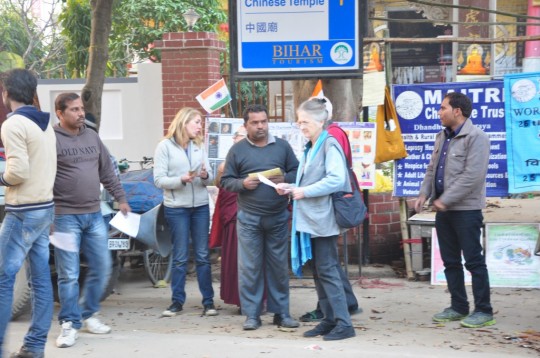
On World Leprosy Day 2014, Adriana Ferranti (at right with blue bag) works with MAITRI staff and volunteers, January 2014. Photo courtesy of Adriana Ferranti.
On January 25, MAITRI Charitable Trust participated in World Leprosy Day, founded in 1953 by French writer and humanitarian Raoul Follereau. Director Adriana Ferranti serves some of India’s poorest people in the state of Bihar and has worked for 25 years to eradicate Hansen’s disease (leprosy), a treatable bacterial infection, and to reduce the stigma against physical disability associated with the disease. This year, Adriana and her staff decided to share a brief video to illustrate the work they do daily.
Watch “MAITRI World Leprosy Day” on YouTube.
Since MAITRI’s founding, the organization has expanded its services to the public and currently offers physical rehabilitation for disabled people, health clinics to control the spread of tuberculosis, pre- and post-natal support programs, HIV- and AIDS-related services, education programs, clean water and afforestation programs, aid programs, and animal clinics. Two short videos, “Seven Days of MAITRI” and “Actions of MAITRI” give a taste of what MAITRI staff and volunteers accomplish each week.
Watch “Seven Days of MAITRI” on YouTube.
Watch “Actions of MAITRI” on YouTube.
Mandala brings you news of Lama Zopa Rinpoche and of activities, teachings and events from nearly 160 FPMT centers, projects and services around the globe. If you like what you read on Mandala, consider becoming a Friend of FPMT, which supports our work.
- Tagged: adriana ferranti, maitri charitable trust, video
- 0
2
News from Finland’s Tara Liberation Study Group
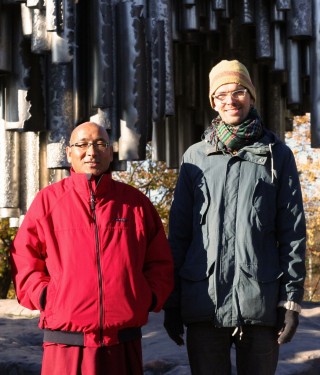
Geshe Sherab and Mikko Putkonen in front of the Sibelius Monument, dedicated to the Finnish national composer Jean Sibelius (1865-1957), Helsinki, Finland, October 2014. Photo by Jere Valkonen.
Student Maria Suominen from Tara Liberation Study Group in Helsinki, Finland, reports:
The past months have been busy for our small yet active group. In the summer of 2014 we hosted the Maitreya Loving Kindness Tour and in the autumn we have been blessed with several inspiring teachers. We are fortunate to have a committed new coordinator, Mikko Putkonen, who is full of energy and ideas, and who helps activate the group when it comes to volunteering and joining our forces.
In September, Glen Svensson taught us about the stages of the path, greatly supporting our studies on Discovering Buddhism, Module 3. Prior to that, Joona Repo gave insightful teachings on the module. In October, we were happy to get Geshe Thubten Sherab to Helsinki. His four days here provided us with instructions on how to prepare for death, as well as on helping others confront the inevitable. This gave a wonderful start for our studies on Module 5 and Geshe-la’s sense of humor made the topic less somber. Two people took refuge from Geshe-la, while many were thankful for the opportunity to renew refuge and lay vows with him. We will continued to receive guidance from exceptional teachers when Ondy Willson came to Helsinki in November and Ven. Robina Courtin in December.
In August the Maitreya Loving Kindness Tour attracted more than 400 visitors; thanks to people from different Buddhist groups who helped make the relic tour a success. Internationally speaking, some of us attended Lama Zopa Rinpoche’s and His Holiness the Dalai Lama’s teachings at Istituto Lama Tzong Khapa in Italy. Mikko and Susanna (Mikko’s wife) visited the Institut Vajra Yogini in France, where Mikko attended the Foundation Service Seminar. Other group members went for teachings at Jamyang in London and at Root Institute in India.
Find more information about Tara Liberation Study Group on its new Facebook page.
Mandala brings you news of Lama Zopa Rinpoche and of activities, teachings and events from nearly 160 FPMT centers, projects and services around the globe. If you like what you read on Mandala, consider becoming a Friend of FPMT, which supports our work.
- Tagged: geshe sherab, tara liberation study group
- 0
30
His Holiness the Karmapa Meets Ragni at Root
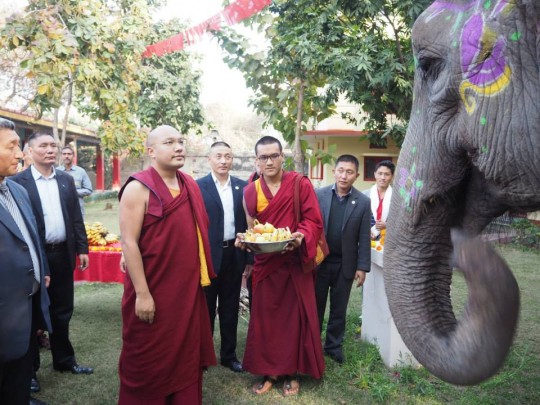
His Holiness the Karmapa meets Ragni for the first time, Root Institute, Bodhgaya, India, January 2015. Photo courtesy of Root Institute via Facebook.
On January 10, His Holiness the Karmapa paid a visit to Root Institute, a busy FPMT center in Bodhgaya, India. While there, His Holiness for the first time met Ragni, the mate of Bodhichitta, a male elephant offered to Lama Zopa Rinpoche and supported materially in part through the Lama Zopa Rinpoche Bodhichitta Fund. His Holiness brought Ragni her own bowl filled with mangos, bananas and other fruit.
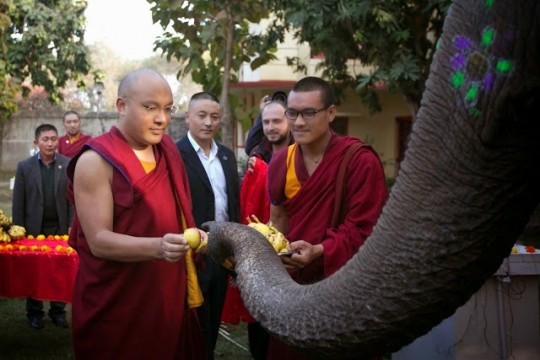
His Holiness the Karmapa offers fruit to Ragni, Root Institute, Bodhgaya, India, January 2015. Photo courtesy of http://the17thkarmapa.blogspot.com.
Ragni is expecting a baby next year and Root Institute staff currently support her caretaker as he works with the state government to acquire land for both her and Bodhichitta. On the new land, they’ll be able to live without chains or a mahout, an elephant keeper. Currently, Root Institute sponsors one day of food a week, a weekly commitment of 3,400 rupees (US$55). In addition to material support, Ragni and Bodhichitta are regularly circumambulated around the Mahabodhi Stupa and the holy objects on Root Institute’s grounds as part of their spiritual care.
You’re invited to help Root Institute support Ragni and Bodhichitta.
Mandala brings you news of Lama Zopa Rinpoche and of activities, teachings and events from nearly 160 FPMT centers, projects and services around the globe. If you like what you read on Mandala, consider becoming a Friend of FPMT, which supports our work.
- Tagged: animals, his holiness the karmapa, root institute
- 0
29
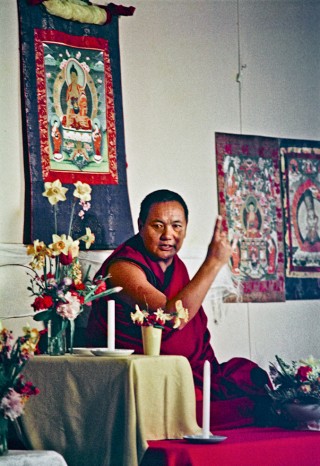
Lama Yeshe teaching at Olinda, Australia. On July, 26 1976, Lama Yeshe gave a public lecture in Melbourne. That same evening a weekend course for eighty commenced at Olinda in the Dandenong Ranges outside the city. Photo courtesy of Lama Yeshe Wisdom Archive (lamayeshe.com).
What if your dear mother were caught in a blazing fire? You would not relax and say, “Let her burn. I don’t have time to get her out right now. I’ll do it later.” Of course you would stop whatever you were doing, no matter how seemingly important, and immediately rush to rescue her. We must regard all beings as our mother – and they are indeed trapped and burning in the fire of wrong conceptions and negativities. We must not be lazy about this! We must transform every action – eating, sleeping, working – into Dharma wisdom.
But we are lazy, aren’t we? Our impure mind lets us live life as if it were a tea party: “Let my mother burn – I’ll pull her out of the fire when I’ve finished enjoying myself.” Of course, we do not say these words, but our inner feeling, beyond words, reflects this attitude. Be careful; we often behave like this.
All the same, we don’t need to get too emotional about all this. If I pump you up too much, you’ll get overexcited and not want to do anything but run off to the mountains to meditate or run off preaching that everybody should practice Buddhism just like you do. That becomes another problem.
– Lama Yeshe, from When the Chocolate Runs Out, published by Wisdom Publications
Lama Yeshe was the founder of the Foundation for the Preservation of Mahayana Tradition (FPMT), a Tibetan Buddhist organization dedicated to the transmission of the Mahayana Buddhist tradition and values worldwide through teaching, meditation and community service.
- Tagged: lama yeshe, when the chocolate runs out
- 0
26
Thubten Norbu Ling Grows
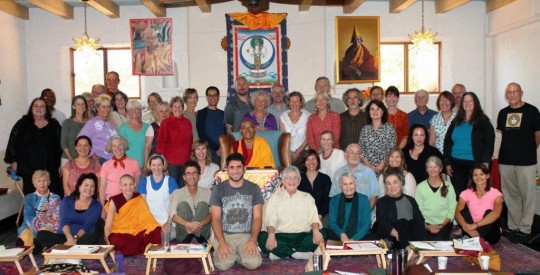
Geshe Sherab with Thubten Norbu Ling retreat participants, Santa Fe, New Mexico, US, September 2014. Photo courtesy of Thubten Norbu Ling.
In late October, Rowena Mayer, director of Thubten Norbu Ling in Santa Fe, New Mexico, US, shared a brief news update with Mandala.
Thubten Norbu Ling has been experiencing promising and beneficial developments. Geshe Thubten Sherab finished his six-month stay with us this year with a wonderful weekend retreat on the power of purification. Over 40 people attended the retreat for the two days which concluded with a Dorje Khadro fire purification practice under the sunny skies of Santa Fe.
Since Geshe-la arrived almost two years ago, the number of people coming to our center has grown. This is due to Geshe-la’s presence and Don Handrick’s steady expertise. With both Don and Geshe-la as resident teachers, we are able to offer a greater variety of programs. We have also started a Sunday program for children based on the 16 Guidelines. The main host is our new assistant director, Adam Baker. Judith Baillie, a current board member, is hosting a weekly recovery support group incorporating Buddhist principles to help people overcome addictions.
Due to all this new activity and our plans to develop our program further, we may soon outgrow our current center space!
Mandala brings you news of Lama Zopa Rinpoche and of activities, teachings and events from nearly 160 FPMT centers, projects and services around the globe. If you like what you read on Mandala, consider becoming a Friend of FPMT, which supports our work.
- Tagged: geshe thubten sherab, thubten norbu ling
- 0
22
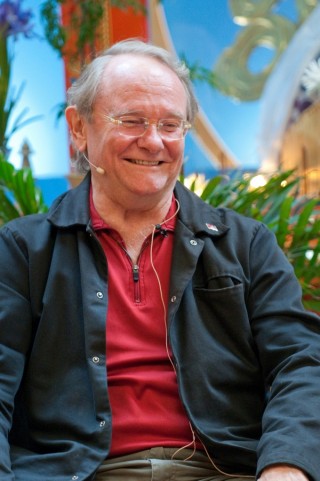
Professor Jeffrey Hopkins, Maitripa College, Portland, Oregon, United States, September 2011. Photo by Marc Sakamoto.
Dr. Jeffrey Hopkins, now 74, is professor emeritus at the University of Virginia and one of the world’s top scholars of Buddhism. He has published 42 books, acted as His Holiness the Dalai Lama’s translator, and had a long academic career during which he trained many prominent Tibetan Buddhist scholars and translators. He currently leads UMA Institute for Tibetan Studies. Dr. Hopkins has been remarkably open in public about a wide range of matters, such as his initial lack of faith in His Holiness, past-life memories, a near-death experience, his youthful delinquency, his sexuality, and so on.
Donna Lynn Brown interviewed him in December 2014 to find out what lessons his honesty might hold for other Buddhist practitioners.
Dr. Hopkins, what is the source of your frankness? Why are you so open?
I was born in 1940 in Barrington, Rhode Island, and I was in my teens in the 1950s. There was a group of us who were disgusted by the aims that were being presented to us: merely making money and so forth. There was a lot of rebellion that was focused against the dishonesty of society, which gradually in my own mind became a matter of seeking my own integrity. My own integrity meant a great deal to me.
I was part of a juvenile gang that got into difficulty with the law, in the sense of increasingly violent pranks, drinking and so forth. It was a relief when I went to a liberal prep school where students were given a great deal of responsibility for their own governance. Despite all my acting out at my public school, I responded very well in that kind of environment, and got excellent grades, because we were respected as people, which is something I had lacked prior to that. Then, in my first year at Harvard, I read Walden by Henry David Thoreau and I was inspired to leave Harvard for the woods of Vermont. I stayed in a small one-room cabin and read, wrote poetry, walked a lot, dreamt out my recurrent trapped dreams, and I believe at that point, began finding my own integrity. And I kept returning to that kind of life.
I was inspired by Herman Melville’s novel Typee, which is set in the Marquesas, north of Tahiti near the equator, and Somerset Maugham’s The Moon and Sixpence about the artist Paul Gauguin, who painted in the South Seas. It was 1960 and when Vermont got too cold for the wood heater, I went to the woods in Rhode Island. When that got too cold, I shipped out of New York as a passenger on a freighter to Tahiti. I had gotten used to meditating in Vermont on the lake that was down below, and by gazing off into space. On the freighter I would lie on my back and stare upward, filling my mind with the blueness of the sky. The Pacific Ocean was clean and tremendously calm and I filled my mind with that. I didn’t have a visa for Tahiti and after a while some official noticed this and asked me to leave. I used all but my last $15 to take a seaplane to Hawaii. It was nuts, but it was a search for my own integrity.
19
Shedrup Zungdel Study Group Welcomes Ven. Rita Riniker
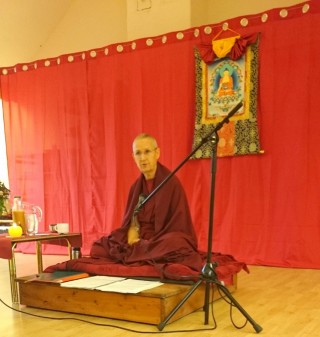
Ven. Rita Riniker teaches at Shedrup Zungdel Study Group, Burg-Reuland, Belgium, December 2014. Photo courtesy of Shedrup Zungdel Study Group.
Student Marguy Krier from Shedrup Zungdel Study Group in Beligum sent Mandala a short news update:
On a rather cool December 2014 weekend, Ven. Rita Riniker worked with more than 22 students from Shedrup Zungdel Study Group in Burg-Reuland, Belgium in order to adjust our internal compasses so as not to let fear and shame grow into feelings of guilt. We examined our expectiations, our motivations and our goals. We learned about how setting limits, taking responsibility and not identifying with “the dirt” will lead us to more compassion for ourselves and for others. Looking with empathic eyes at our karma, seeking opportunities for growth and learning will certainly help us to become more resilient and agreeable for all living beings around us.
We do wish that again and again that we may have the opportunity to greet and enjoy Ani Rita in our midst. Her kind and simple way of being helps us so much. And her loving and wise way of teaching opens up our hearts!
Mandala brings you news of Lama Zopa Rinpoche and of activities, teachings and events from nearly 160 FPMT centers, projects and services around the globe. If you like what you read on Mandala, consider becoming a Friend of FPMT, which supports our work.
- Tagged: belgium, shedrup zungdel study group, ven. rita riniker
- 0
15
Romania Celebrates Lama Tsongkhapa Day
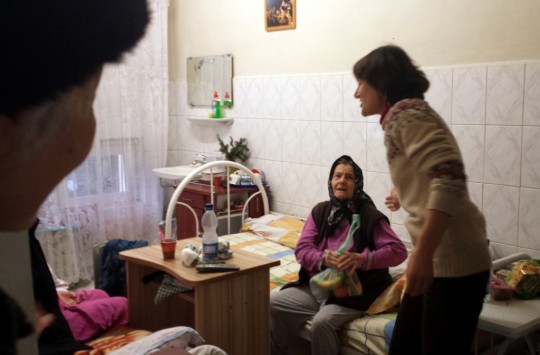
Students from Grupul de Studiu Buddhist White Tara visit a home for seniors and bring gifts, Romania, December 2014. Photo courtesy of Thubten Saldron.
Thubten Saldron, study group coordinator of Grupul de Studiu Buddhist White Tara in south central Romania sent news about the group’s activities and how it spent Lama Tsongkhapa Day in 2014:
In September, we started to study Discovering Buddhism online, which bring us so much understanding. All our gratitude for all who are involved in this meaningful project!
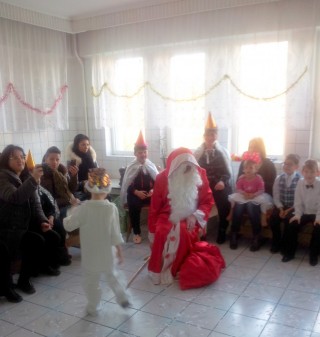
Students from Grupul de Studiu Buddhist White Tara also visited a center for children with developmental disabilities, Romania, December 2014. Photo courtesy of Thubten Saldron.
On December 16, we honored Lama Tsongkhapa Day by practicing what we studied. In the morning, we blessed food for poor children with a tsog. We also went with other gifts to one center for children with developmental disabilities and to a home for older people abandoned by their families. At the end of the day, we liberated some fish.
We did all these activities with the motivation to make people happy and at the end, all of us experienced the real happiness of serving others.
Mandala brings you news of Lama Zopa Rinpoche and of activities, teachings and events from nearly 160 FPMT centers, projects and services around the globe. If you like what you read on Mandala, consider becoming a Friend of FPMT, which supports our work.
- Tagged: grupul de studiu buddhist white tara, romania
- 0
- Home
- News/Media
- Study & Practice
- About FPMT Education Services
- Latest News
- Programs
- New to Buddhism?
- Buddhist Mind Science: Activating Your Potential
- Heart Advice for Death and Dying
- Discovering Buddhism
- Living in the Path
- Exploring Buddhism
- FPMT Basic Program
- FPMT Masters Program
- FPMT In-Depth Meditation Training
- Maitripa College
- Lotsawa Rinchen Zangpo Translator Program
- Universal Education for Compassion & Wisdom
- Online Learning Center
- Prayers & Practice Materials
- Overview of Prayers & Practices
- Full Catalogue of Prayers & Practice Materials
- Explore Popular Topics
- Benefiting Animals
- Chenrezig Resources
- Death & Dying Resources
- Lama Chopa (Guru Puja)
- Lama Zopa Rinpoche: Compendium of Precious Instructions
- Lama Zopa Rinpoche: Life Practice Advice
- Lama Zopa Rinpoche Practice Series
- Lamrim Resources
- Mantras
- Prayer Book Updates
- Purification Practices
- Sutras
- Thought Transformation (Lojong)
- Audio Materials
- Dharma Dates – Tibetan Calendar
- Translation Services
- Publishing Services
- Teachings and Advice
- Find Teachings and Advice
- Lama Zopa Rinpoche Advice Page
- Lama Zopa Rinpoche: Compendium of Precious Instructions
- Lama Zopa Rinpoche Video Teachings
- ༧སྐྱབས་རྗེ་བཟོད་པ་རིན་པོ་ཆེ་མཆོག་ནས་སྩལ་བའི་བཀའ་སློབ་བརྙན་འཕྲིན།
- Podcasts
- Lama Yeshe Wisdom Archive
- Buddhism FAQ
- Dharma for Young People
- Resources on Holy Objects
- Ways to Offer Support
- Centers
- Affiliates Area
- Teachers
- Projects
- Charitable Projects
- Make a Donation
- Applying for Grants
- News about Projects
- Other Projects within FPMT
- Support International Office
- Projects Photo Galleries
- Give Where Most Needed
- FPMT
- Shop
Subscribe to FPMT News
Translate*
*powered by Google TranslateTranslation of pages on fpmt.org is performed by Google Translate, a third party service which FPMT has no control over. The service provides automated computer translations that are only an approximation of the websites' original content. The translations should not be considered exact and only used as a rough guide.Dharma is a total way of life. It’s not just for breakfast, Sundays, or the temple. If you’re subdued and controlled in the temple but aggressive and uncontrolled outside of it, your understanding of Dharma is neither continuous nor indestructible.







